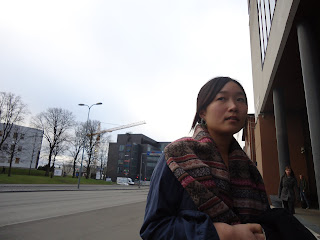1. From what I've seen, pulla is the staple pastry of Finland. It's a sweet bread with cardamon spice, and baked in various shapes. I've seen pulla sold in every bakery that I've been to, in grocery stores, at the university and in train stations.
(Best served warm and eaten with coffee, pulla is a joy for the sweet tooth.)
- More information: http://en.wikipedia.org/wiki/Pulla
~~~~~~~~~~~~~~~~~~~~
2. Salmiakki. Wow, where to begin. This salty liquorice, popular in the Nordic Countries, is eaten as candy, and as flavoring in cakes, ice cream and alcoholic beverages. On Wikipedia, someone warns that it is "an acquired taste and people not familiar with ammonium chloride might find the taste physically overwhelming and unlikeable."
Most international students tried it for the first time by mistake. One friend got salmiakki on her vanilla ice cream, thinking that it was a dark chocolate topping. "The taste was an absolute shock," she commented on my post about salmiakki. "Until then I had no idea such a flavour existed!!!" Another friend bought carrot cake with what she thought were pieces of chocolate on top. She was not happy. In response to the post, my Finnish friend Henri joked: "Salmiakki is "an acquired taste, not for pansies." -Henripedia".
I discovered salty licorice for the first time this summer, when I thought I was buying a pack of mints. It was the weirdest taste I've ever encountered. Despite my facial expressions, everyone in my class tried it, and everybody disliked it except for one girl. Actually, she loved it.
If you'd like to try Salmiakki, let me know and I'll try to send you some. It's everywhere here.
- More information: http://en.wikipedia.org/wiki/Salty_liquorice
~~~~~~~~~~~~~~~~~~~~
3. I filmed some international students' responses to Mämmi, a traditional Finnish Easter dessert three weeks ago (view it here). Mämmi is a thick porridge made from water, rye flour and powdered rye malt. It is baked, stored in the fridge and served with sugar and cream. It was a Germanic invention, and remains a very typical desert in Finland.
(Mämmi comes in second to Salmiakki for strange tastes.)
~~~~~~~~~~~~~~~~~~~~
4. I haven't actually tried Leipäjuusto (bread cheese), but I've noticed it at every grocery store I've been to. Leipäjuusto is also known as Finnish squeaky cheese, and it is fresh cheese made from cow's milk, and traditionally from cow's beestings. The texture is firm, slippery and rubbery.
Before I knew what it was, I thought it was mozzarella cheese that I could heat up and eat with olive oil and salt. Actually, I heard it's eaten as a desert or with coffee. I'd really like to try it!*
*Update: I just tried it. It definitely squeaks as you chew it. I don't like the flavor at all. It's like salty milk. But I'm not much of a milk drinker. Anyway...
- More information: http://en.wikipedia.org/wiki/Leip%C3%A4juusto
- A blog post: http://noonionplease.wordpress.com/2011/03/23/finnish-delicacy-leipajuusto-with-cloudberries/
~~~~~~~~~~~~~~~~~~~~
5. One bite into Riisipiirakka (Karelian pasties), and I'm in heaven.Riisipiirakka has a hard crust made of rye and wheat, and it is filled with a rice porridge filling. The dish comes from Karelia, which is situated between Russia and Finland. It is best served hot and with a topping of blended boiled eggs and salted butter.
- More information: http://en.wikipedia.org/wiki/Karelian_pasties
~~~~~~~~~~~~~~~~~~~~
We eat food for survival. We eat food for pleasure. We share and pass down recipes with attached culture, history and stories. I hope you enjoyed reading about some of the foods I found interesting in Finland!
Note: Cultural significance and pleasurable experiences shouldn't steal the limelight from hunger, the number one risk to health. According to the Food and Agriculture Organization, 925 million people in the world are hungry. You can find out more about hunger on the World Food Programme's website: http://www.wfp.org/.
If you're in Eugene, consider helping out Food for Lane County: http://www.foodforlanecounty.org/en/.




















